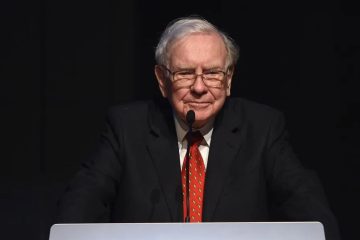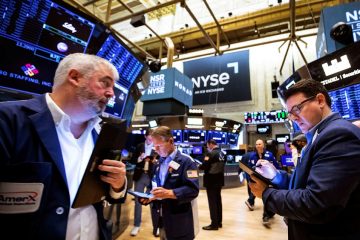Warren Buffett’s Berkshire Hathaway Poorly Governed?
Warren Buffett, often held up as a shining example of the benign side of capitalism, has been known to lecture investors and corporations alike on good behavior.
But it doesn’t seem as though he’s following his own advice. His company, Berkshire Hathaway Inc. (BRK-A), hasn’t paid a dividend since 1967. All the while indulging in share buybacks from time to time.
Cash dividends are useful for keeping management in check, especially when there’s so much temptation to leverage.
This trend presents a problem – one that’ll become even bigger whenBuffett eventually retires.
Buffett’s Disinclination for Dividends
Years ago, Buffett said that he didn’t pay dividends because he believed he could reinvest the money better than shareholders could, especially since shareholders suffered an additional income tax on the money before they got it. (That tax has subsequently been reduced to 20%, weakening his argument.)
He regarded the insurance companies he owned, such as GEICO, as vehicles generating cash for his investment activities, and he didn’t want to divert that cash to shareholders.
That was all very well and good when Buffett produced superior investment returns. But he’s almost 86 years old now, and Berkshire Hathaway lost its shareholders 12.5% in 2015, compared to a 1.2% return on the Standard and Poor’s 500 Index, including dividend reinvestment.
With $ 24 billion in net income and $ 31 billion in operating cash flow in 2015, Berkshire Hathaway could well afford to pay a dividend.
A payout of $ 3,000 per share, to give the shares a yield of 1.4%, would absorb less than 25% of earnings, and so would be perfectly affordable.
It would also force Buffett and his successors to be disciplined in their investment strategy, as well as prevent the company from growing so large it becomes unmanageable or unable to earn superior returns. This is a problem Buffett himself has already identified.
Once Buffett retires, there’s no reason to believe his successor will be able to reproduce Buffett’s investment success. So the best move would be to pay at least a substantial portion of the profits to shareholders and allow them to make their own decisions.
The Problem With Repurchases
Buffett’s reasoning against paying dividends is further weakened by his proposal to repurchase stock when it gets down to 125% of net asset value (NAV).
Here, the problem is one of shareholder democracy and favoritism towards the 1%, large institutions, and the very rich. When Berkshire Hathaway made its last stock repurchase – of $ 1.3 billion in 2012 – Buffett said it enabled him to accommodate some large shareholders who wanted to sell.
My problem with this is, unless they’re carried out by public tender and open to all shareholders, stock repurchases are a form of favoritism between shareholders that shouldn’t be permitted.
Before 1982, stock repurchases without a full public tender offer were considered “insider trading,” and were forbidden by the SEC.
Naturally, the lobbying against it was very strong, and the rule was changed during the generally deregulatory Reagan administration. It’s one of the few cases for which I believe the regulation was correct, as the possibilities for abuse are all too evident.
For example, the huge volume of stock repurchases in the last few years were undertaken alongside record corporate profits and stock market levels.
Neither condition is permanent. And by repurchasing stock and financing the repurchases with debt, companies are asking for trouble in a downturn, such as having to undertake an emergency capital raising at prices far below those at which stock was repurchased.
This would severely damage shareholders’ interests, even if management cashed in its stock options in the interim.
Berkshire Hathaway’s debt is moderate, at only one-third of its equity, and its stock repurchases have been relatively modest. Nonetheless, repurchasing stock at 125% of NAV dilutes the NAV itself, and would prove to be a foolish move if the stock comes to sell below NAV. And it certainly could be the case during a downturn or after Buffett’s retirement.
Berkshire Hathaway’s Future
Stock repurchases are a corporate governance problem, especially if done in large quantities.
Dividends are a useful discipline, forcing management to pay out cash to shareholders, rather than carrying out stock repurchases, which encourage the issuing of stock options to management.
Buffett knows this. And before he retires, he would be wise to change Berkshire Hathaway’s practices in this respect.
If Buffett moves to a cash dividend as outlined above, I would be inclined to recommend Berkshire Hathaway as an investment for income investors at no more than 130% of book value.
It’s generally well-managed, and Buffett’s reputation suggests he would choose high-quality successors who would continue to uphold his standards.
But without a dividend, I would hesitate to recommend it even for non-income investors. There’s simply too much temptation for bad behavior in the present governance structure.
Good investing,
Martin Hutchinson









